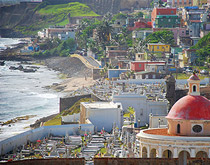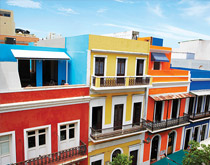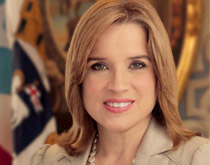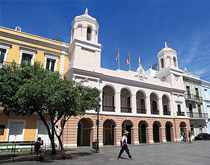
Carmen Yulin brushes her hand over the worn mahogany desk. The newly elected mayor of San Juan, Puerto Rico, feels the scratches. She pictures the original owner, Dona Felisa Rincon de Gautier, the first woman to be elected as mayor of a capital city in the Americas. When Yulin sits at the desk, she thinks of her grandmother.
Earlier that morning, she can be seen shaking hands of well-wishers who gathered to see her at the Plaza de Armas, the city’s popular square. “As a Puerto Rican and as a resident of San Juan, I am thrilled to be starting this new era,” she tells them. Then, she walks toward the Alcaldia, a colonial building erected in 1602 at the northern end of the plaza, in one of the most historic cities of the New World.
San Juan, settled after Christopher Columbus’ second voyage in 1493, rose to prominence in the rich Spanish empire, owing to its strategic military location, port, and proximity to Latin America. After 400 years of colonial rule, Puerto Rico was ceded to the United States at the end of the Spanish-American War in 1898. San Juan and the island itself became an important part of the American geopolitical framework in the Caribbean and continues to be vital in trade, tourism, and housing of U.S. military facilities.
When Yulin arrives at the thick wooden doors at the entrance of the Alcaldia, she’s met by Margarita Acosta, protocol director of the town hall for almost 30 years. “I give you the most fabulous welcome. May all your dreams come true, and may you allow us to be part of those dreams,” Acosta says as she warmly embraces the new mayor.
Climbing the grand staircase to the main office, now hers, Yulin focuses on what lies ahead. She thinks of the people who voted for her. She carries the weight of “their hopes” as the third woman to become mayor of the capital city in Puerto Rico’s history. She recalls the women who climbed the stairs before her—Dona Felisa Rincon de Gautier, fondly called Dona Fela by Sanjuaneros, and Sila Maria Calderon, the second woman to be elected to the office.

They each etched their marks, in their own ways. Dona Fela transformed San Juan into a Latin American urban and cultural center and took care of the elderly, the indigent, and the poor. A staunch advocate of women’s rights, she became one of Puerto Rico’s first suffragettes. She organized the first preschool child-care centers on the island, the model later used to create Head Start. She enchanted the children of the city by having snow flown in from the United States as a Christmas gift. Although some saw this as extravagant, it was magical to many who remember it.
Meanwhile, Calderon, as mayor, sought to end corruption, restore confidence in government, and balance the Alcaldia’s coffers. She undertook one of the most ambitious public works programs in the city to date and sought to empower underprivileged communities, such as El Cano Martin Pena, and stimulate economic growth.
Yulin knows she inherited their mantle to do what she says she was taught at Carnegie Mellon—make government efficient and accountable without losing its core, which is to serve people and help them achieve a better way of life economically and socially.
Less than six months ago, the thought of a Yulin administration was preposterous. For the past 12 years, the island’s largest city was under the rule of Jorge Santini, of the New Progressive Party (NPP). Santini, whom the local media labeled a supercilious local cacique, went by the moniker in Spanish of ese hueso duro de roer (a hard nut to crack), for his supposed invincibility at the polls. Many in San Juan considered his style arrogant and brutish. He boasted of his major contributions to the capital city, including cyclopean obras (such as the Natatorium), a Trump-style golf course, and the San Juan Wildlife Museum. His was a development policy many political experts denounced as wasting money on extravagant projects while the rest of the district suffered. Santini, though, ever confident, sent a 2011 Christmas card of his family gathered behind a taxidermy scene—a stuffed leopard sinking its teeth into an antelope’s delicate neck. Some saw it as a veiled message to his opponents for the upcoming 2012 elections.
Not for an instant did Santini supporters believe he would lose, even though critics became increasingly vocal about what they perceived as a dogmatic style. They started turning their attention to the underdog candidate of the Popular Democratic Party (PDP), Yulin, who dreamt of becoming Alcaldesa (Mayor) of San Juan since she was a little girl.
She credits her grandmother, Lutgarda Vega, nicknamed Yulin, for nurturing her dream and “igniting the passion to help others.” In the 1940s, Vega received a scholarship to New York University and Columbia University, at a time when it was practically unheard of for a woman from the island to seek higher education. She climbed out of the extreme poverty of her roots—at the Central Guanica, the largest sugar mill on the island, where her father was a sugar cane worker—to become director of the School of Physiotherapy of Puerto Rico, where she remained until she retired.

Like her grandmother, Yulin grew up determined and focused, according to her friends, who note that her leadership skills were evident early on. Even as a young girl in a male-dominated society, she became class president from the eighth grade until she graduated from the island’s renowned University High School. By her senior year, she was also the president of the student council and the captain of the track and field team.
Her grandmother’s example inspired her to pursue her studies in the United States. She earned a bachelor’s degree in political science from Boston University, graduating cum laude. She went on to complete a master’s degree from the Heinz College at Carnegie Mellon University, where she became the first student to receive the Spirit Award, now known as the Barbara Jenkins Award, given annually to a graduating student who demonstrates service to the community and makes significant contributions to the residents’ quality of life.
After graduating from Carnegie Mellon in 1986, she was head-hunted by the Pittsburgh-based corporation Westinghouse and joined its human resources executive team. From there, she went on to hone her craft as director of human resources of other companies such as Colgate-Palmolive, Banco Popular, and eventually the U.S. Treasury Department. Working in human resources in the late 1980s, she saw “diversity as an opportunity, as a beginning, not as something to be avoided, to succeed.” This lesson in the power of diversity is one she says she carried forward as she entered the world of politics.
She returned to Puerto Rico in 1992, having been recently divorced and responsible for raising her 18-month-old daughter. She wanted the network of her family around her to help her raise her child. After settling in, she became the political advisor to Calderon, learning firsthand the inner workings of the Alcaldia. As was no surprise to anyone who knew her, given her history and her childhood dreams, she entered politics in 2000, running for office as the representative for District One.
She lost. “Nobody that goes into politics goes into it thinking that it is okay to lose.” she recalls. “I cannot tell you I felt good losing. I didn’t.” But her conviction that politics could enhance people’s lives kept her in the game. She became the political advisor to the president of the House of Representatives, Carlos Vizcarrondo Irizarry. Having cut her political teeth, she ran again for the House of Representatives in 2008 and won. She says that time was different because she went grass-roots, going “direct to the people, talking to them, making them understand I cared.”
As the 2012 mayoral elections neared, Yulin expressed an interest to run for the top office, but she was largely ignored by her own party, the PDP. The party’s leaders, especially the governor, Alejandro Garcia Padilla, had their sights set on the vice president of the party, Hector Ferrer, to go head-to-head with Santini. It was not until Ferrer’s political career was derailed by a domestic violence scandal that Yulin stepped into the running, just six months short of the elections.
Her first words upon accepting the nomination to run for mayor of San Juan were: “My name is Carmen Yulin, and I am the next mayor of San Juan.” Fully aware of the power of social media, she then tweeted what was to become the heart of her campaign: Cada guaraguao tiene su pitirre (every hawk has its kingbird to contend with). The pitirre is a tiny but ferocious bird that defends itself against the attack of a larger predator. Yulin became the pitirre to Santini’s mighty guaraguao. The tweet exploded on social media and “Yulinmania” took flight.
The statement and her eventual victory didn’t come easily. She admits it was a risky campaign to undertake; some considered it political suicide. But Yulin says she had been well schooled at CMU in competitive spirit and the love of a challenge, not liking things “that are too easy.”
The opposition tried to paint her as the last recourse of a weak party. Santini belittled her campaign, calling her a socialist—an echo of Venezuela’s Hugo Chavez and Cuba’s Fidel Castro. In a clear lack of respect for his opponent, he never called her by her name, addressing her only as esa señora (that lady). He enlisted female politicians in the NPP to his cause—who claimed that “a real lady” would not run a campaign such as hers. They criticized her for being a single parent, because she had been married more than once, and because at one point as an adult she had had personal financial woes after losing her job.
With less than six months to run a campaign as a heavy underdog, Yulin was undaunted. She implemented what she had learned in the classroom. “CMU gives you a way of thinking, a structured approach to problem solving that helps you eliminate all of the disarray around you so you can get things done. What do you do with a big problem? You break it down into little problems, and you solve them simultaneously, that’s the one thing I learned so well at CMU.”

She decided to run an unconventional campaign, one of alliances, inclusion, and a message of hope and personal attachment. It was a short campaign; she had very little money, so she had to be bold. She wove the many disenfranchised sectors of San Juan together—the lesbian, gay, bisexual, and transgender community; people from other parties who wanted governance in a different manner; the women’s movement; and poor communities such El Cano Martin Pena, all who needed a platform for their voice to be heard. Her platform was one of job creation, transparency, and co-government—which would champion women’s rights and the needs of the poor. She spoke in the language of the people—en arroz y habichuelas (in rice and beans)—and told them, Aqui estoy (“I am here”).
She called the campaign Operacion Hormiga Brava—Operation Red Ant, one in which she was the Queen Ant with her patchwork colony of soldier ants. “You know when you are bitten by a red ant, you hardly notice. But then one comes out, then another, and before you know it you are overrun. They are very small. But when they come together, they do so as a very powerful force.”
With her Red Ant army, she went on the campaign trail, often unpretentiously dressed in her signature khakis, white shirt, and red bandana stamped with the emblem of her party, La Pava—talking to voters face-to-face, shaking hands, dancing, and singing her way to the polls. Her message was simple, yet powerful: I am one of you.
She used social media and urban music, quoting the multi-Grammy-winner Puerto Rican singer Rene Perez, of the group Calle 13, who had been at odds with Santini over political differences. The anthem of her campaign was a phrase from one of Perez’s songs: No tengo mucha plata, pero tengo cobre. Aquí se baila como bailan los pobres.
“This was not a campaign,” she says. “This was the beginning of a movement, of a movement to give back the municipal government to its people, so that it reflects a new way of thinking, a new way of governing.”
Her red ants brought her to victory. Santini, stunned, conceded in tears. In his concession, he at last called her by name—Alcaldesa Carmen Yulin.

The day of her swearing in, Yulin purposely wore white. She wanted to send a message that the slate was clean, that it was a new start. She wore her hair in a Jackie Kennedy bun and carried Dona Fela’s fan, made of black mother of pearl with white sequins. She placed her hand on the bible of the woman who had been a major presence in her life, the one she wished to emulate. The “good civil servant.” She felt slightly in awe to be compared to her, to be called the second Dona Fela. “I am very humble, just a citizen who, when I make mistakes, will not be afraid to raise my hand, like in basketball, to say my fault.” Then, she adds, “I believe that if I work very hard and fight the good fight, in the end, things will work out for the best.”
On inauguration day, she goes office to office, introducing herself to the employees, basking in their appreciation and approval. As she comes up to the second floor, she catches her first glimpse of that desk pushed off in a corner, covered in dust. It’s a modest desk, one whose only decor is carved borders. As she walks up to it, she brushes her hand across its dark, rich wood. She can feel the history it holds. “Whose desk was this?” she asks. In a low voice, Acosta answers. “That was Dona Fela’s desk.” Yulin immediately asks that it be cleaned and taken to her office. It’s to replace the crisp, modern desk that was Santini’s.
When she sits at the desk, for that first time, she gets the same feeling as when she was a little girl and would run into the ocean—the sense of exhilaration, but also of heightened awareness. She thinks of all the citizens who told her they just want a fair chance to overcome adversity to make life better for themselves and their children, to know that their voices are being heard and that they’re not invisible to the government. Yulin feels she has found her calling, through an alliance never before seen in Puerto Rico.
Susanne Ramirez de Arellano, based in New York City, is an independent writer as well as an experienced news director and Hispanic media consultant.



